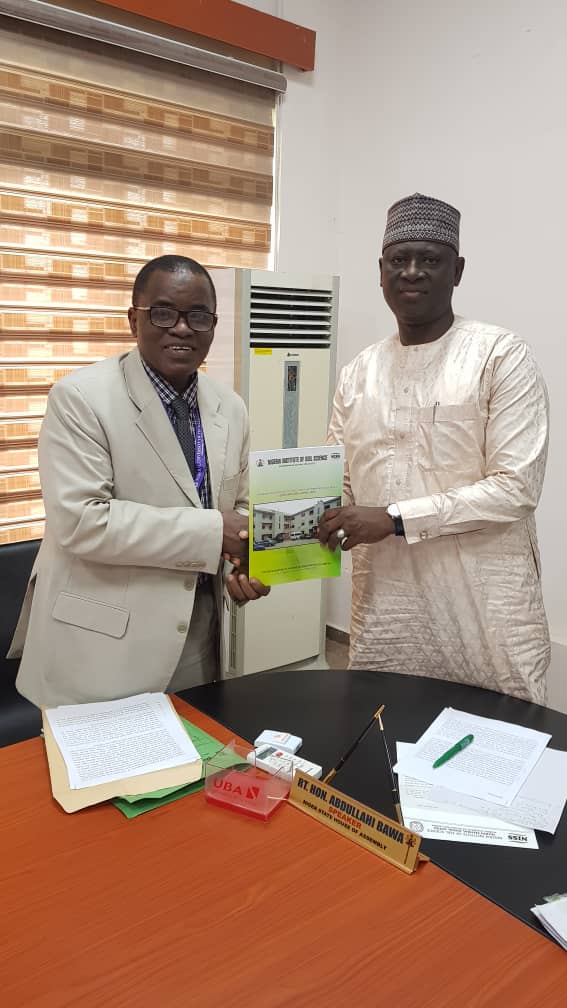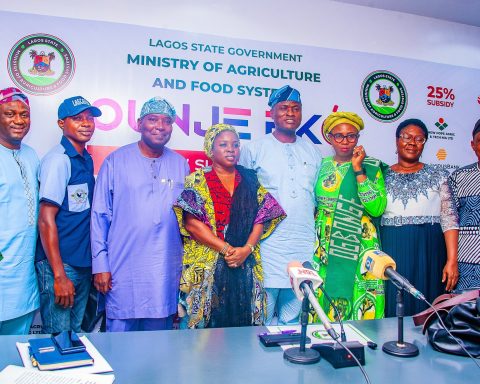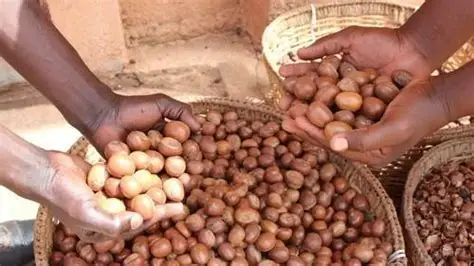Coordinator NISS, North Central Zone, Prof Osunde presents the NISS Annual Report Booklet to the Speaker, Niger State House of Assembly, Hon. Wuse during the visit.
NIGERIA Institute of Soil Science (NISS) has solicited partnership with Niger State Government for training of extension agents across twenty-five local government areas of the State.
Join our WhatsApp ChannelThis is part of concerted efforts to enhance soil quality and boost crop productivity.
Coordinator, NISS, North Central Zone, Prof Akim Osunde, a Fellow of the Soil Science Society of Nigeria (fsssn) and a Registered Soil Scientist (RSS) made the appeal during an advocasy visit to the Speaker, Niger State House of Assembly, Rt. Hon. Abdullahi Bawa Wuse at the State House of Assembly Complex, Minna, Niger State.
Osunde Stated that training of extension agents is important in order to equip them with contemporary skills on the use of soil test kits for monitoring plant nutrient levels in the soil to boost food production by local farmers.
“Various studies cited poor inherent soil fertility and nutrient availability as two major underlying reasons for the wide gaps between potential and actual yields of major crops grown in sub-Saharan Africa. For example, average yield of maize on farmers’ fields in Nigeria is less than 1.00 tons ha-1 compared with global average of 6.00 tons ha-1 and USA average of 11 tons ha-1.
“Nigeria lags behind African countries such as Egypt and South Africa where maize yields are 8.00 and 5.00 tons ha-1 respectively. Closing the yield gaps by remedying the soil limitations is vital to achieving food security. It is clear therefore that the role of soil quality and soil management in crop production cannot be taken for granted”, he revealed.
The Zonal Coordinator disclosed that the relevance of the Institute would be measured based on the number of technologies disseminated to farmers for improved soil and crop productivity.
The Soil Science expert revealed that all investments in crop breeding to produce high yielding varieties, weed and pest control, and other crop husbandry practices would continue to be a waste when due consideration is not given to adequate soil management. He added that NISS was established to correctly diagnose Nigeria’s soil limitations and develop appropriate remediation technologies that could be adopted by majority of farmers.
He said, “We are determined to deliver on our mandate but we cannot do this without active involvement of Niger State Government. We are therefore soliciting for collaboration between NISS and Niger State Government to better the lives of Niger State farmers.”
Furthermore, he informed the Honourable Speaker about the on-going NISS projects in collaboration with OCP-Africa, aimed at managing acid soils with agricultural lime, organic manure and good agricultural practices in some selected farm sites in Niger and Kwara States.
Responding, the Speaker, Niger State House of Assembly, Rt. Hon. Wuse expressed appreciation to the Institute for the advocacy visit which he described as a right step in the right direction in view of the State Government’s commitment to agricultural related projects to boost productivity and enhance food security.
Wuse said the mandate of NISS was fundamental to growth of the nation’s agricultural sector in order to ensure sufficient food production for its teeming population and assured the Institute’s delegation of the State House of Assembly’s support in all its programmes.
He advised the NISS to embark on more awareness campaigns in the State on its mandate and other key issues geared towards improving the quality of crop production.
“This visit is quite significant to the growth of agricultural sector in the State. I will organise a meeting between the NISS and other members of the State House of Assembly at a later date to enable you speak to them on the mandate of NISS as well as the need for them to key into this novel methods of soil cultivation”, he stated.
The Zonal Coordinator was accompanied by the immediate past Dean, School of Agriculture and Agricultural Technology (SAAT), Prof. A. J. Odofin, the HOD, Soil Science and Land Management, FUT, Minna, Dr. Baba Lawal, Dr. (Mrs.) D.T. Ezekiel-Adewoyin and Mrs. Fatima Tanko.
The Nigeria Institute of Soil Science was established by the Federal Government by Act No. 126 of 2017 primarily charged with the responsibility of regulating the practice of soil science in Nigeria, and to provide research backing and other technical services required for enhancing and sustaining productivity of soil resources of Nigeria in order to maximise production of food, with minimum environmental degradation











